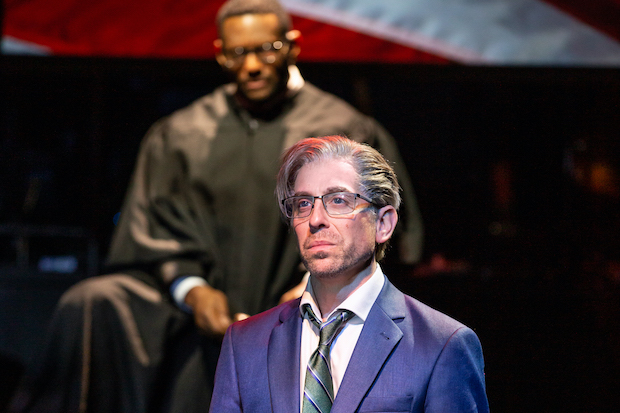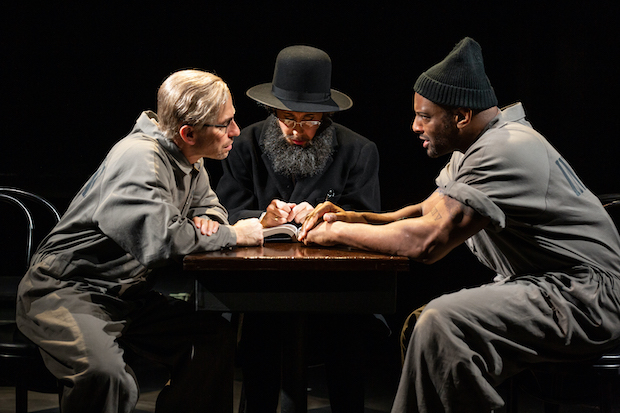Review: In A Turtle on a Fence Post, Hell Hath No Fury Like a Cuomo Scorned

(© Jeremy Daniel)
Political fortunes rise and fall with the seasons: Last year's Cuomosexuals are this year's #MeToo puritans, eager to forget how they once burned a candle for the Love Gov. This phenomenon is nothing new, and has been stylishly musicalized in shows like Fiorello! and Hamilton. The latest political musical at the recently rebranded Theater 555, A Turtle on a Fence Post, is not in the same league as those shows — it often doesn't seem to be operating from the same reality.
It's not the story of a flamboyant politician, but the kind of person who hides behind the curtain, iPhone in hand, hoping not to be noticed by voters like you — that is, unless you run a hedge fund. That person is Hank Morris (Garth Kravits), a political consultant and veteran of the Diane Feinstein and Chuck Schumer campaigns. It is safe to assume that New York's senior senator, who would attend the opening of a letter, won't be catching this show. That's because Morris has fallen out of favor ever since he served prison time for using his influence with State Comptroller Alan Hevesi (also a convicted felon) to steer public pension business toward certain investment firms, which were then rewarding Morris for his services. He's basically a pimp for your retirement fund.
In Morris's telling, his indictment was purely driven by the spite of then-Attorney General Andrew Cuomo, who used his power to punish Morris for not taking his phone calls. "So what if he exploited his access? That's not a crime," his lawyer indignantly argues. In refuting that his behavior constituted pay-to-play, Morris lawyerly adds, "I never worked for the state." Indeed, apologists might argue that Morris was merely a consultant engaged in the business of networking — which is a nice way to polish the revolving door of legal corruption. Eventually, Morris pleads guilty to one charge in exchange for the prosecution dropping the other 122.

(© Jeremy Daniel)
What follows is 25 months in the slammer, a traumatic time for his mother (Joanna Glushak) and wife (Kate Loprest), but also a time in which he connects with several of the less-fortune inmates, like Sars (Richard E. Waits), Chasten (Josh Marin), and terrifyingly muscular and quick-to-anger Z (David Aron Damane). Z is the Andrew Cuomo of Oneida prison, and Morris is naturally drawn to his power.
As far as musical protagonists go, Morris is slightly less sympathetic than Sweeney Todd, and that's without committing murder — unless you count the book musical as a victim. He wrote this script about himself, cutely crediting it to "Prisoner #11R0731." Some scenes have the whiff of lost-cause defense arguments, while others play like interminable therapy sessions. Lip service is paid to systemic racism and the inequities of criminal justice, but it's never long before focus is squarely back on Morris.
"There's always a second act," he musically taunts us after intermission for having decided to discard another hour of our lives. That song, along with several instantly forgettable production numbers and power ballads, makes up the score written by composer Austin Nuckols and lyricist Lily Dwoskin. Most of the numbers have the feeling of trunk songs — vague enough to work in any number of musicals. I sincerely hope that the songwriters are able to repurpose them.

(© Jeremy Daniel)
This vainest of vanity projects at least gets a top-notch production from director Gabriel Barre, whose wizardry keeps this two-and-a-half-hour monstrosity from feeling like a life sentence. The staging is zippy and inventive: Josh Marin regularly steals scenes in his portrayal of an ATM, a pay phone, and a basketball hoop.
Sporting a slicked-back mane of gray hair and chunky glasses, Kravits looks like the TV movie version of Morris. He hits his glory notes while making a good-faith effort to endow his character with real human emotion. Loprest competently plays the long-suffering wife, while stepping in to lucidly unpack some of the exposition. Damane is simultaneously soulful and imposing as Z, his resonant baritone shining in the gospel number "There's a Light." We leave wishing we could see a musical about him.

(© Jeremy Daniel)
The design is expensive-looking by commercial off-Broadway standards: Walt Spangler's set takes advantage of the enormous width of the stage to realistically create "Heckler's Comedy Club," a stand-up venue that provides a frame for Morris's story. His use of levels perfectly facilitates Barre's energetic staging, while a central platform that flips up to reveal a prison commode is awfully nifty. Vanessa Leuck's costumes serve as a force-multiplier in this seven-person musical in which members of the ensemble are always quick-changing. The lighting (Yael Lubetzky) and sound (Twi McCallum) are also professional. None of it can compensate for a lousy book.
There is one genuinely insightful scene in Turtle, but it comes near the very end: The Prince of Darkness himself shows up in a dream sequence (decent Cuomo impression by Erik Gratton) to luxuriate in Morris's obsession, and to remind us that he too will have a second act — and the good Democrats in the audience will probably vote for him. This seems likely, for as long as this remains effectively a one-party state, New Yorkers (the minority who even bother to vote) will assent to whatever crook has D next to his name on the ballot. This makes it easy for guys like Morris to plan out their future graft, which is usually legal because his legislator friends write the rules and carve out the exceptions. Unintentionally, A Turtle on a Fence Post asks us how much longer we will tolerate this behavior.











